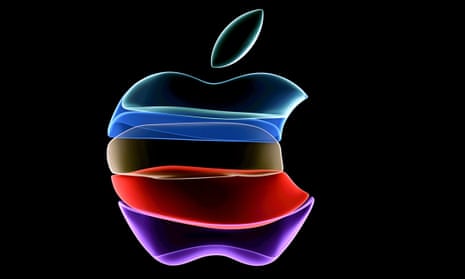Apple’s problems have gone transatlantic. Even as it squabbles with the EU over the Digital Markets Act and nervously eyes the UK’s passage of the Digital Markets, Competition and Consumers bill, the company’s biggest fight is now back at home, after the US government launched what will likely be the antitrust case of the decade.
From our story:
The lawsuit, filed in federal court in New Jersey, alleges that Apple has monopoly power in the smartphone market and uses its control over the iPhone to “engage in a broad, sustained, and illegal course of conduct”. The complaint states that the case is about “freeing smartphone markets” from Apple’s anti-competitive practices, arguing that the company has thwarted innovation to maintain market dominance.
“Apple has maintained its power not because of its superiority, but because of its unlawful exclusionary behavior,” the US attorney general, Merrick Garland, stated in a press conference on Thursday. “Monopolies like Apple’s threaten the free and fair markets upon which our economy is based.”
The case is a grab-bag of accusations, taken from across the sprawling market that Apple dominates, largely attempting to prove the most important claim in US antitrust law: consumer harm. It may be frustrating to compete against Apple but if that lack of competition doesn’t result in harm to consumers, then the case is a nonstarter.
And so the lawsuit ranges from Apple’s policies that limit third-party smartwatches from working with the iPhone, while allowing the Apple Watch to merge easily, to the diminished status of SMS messages from Android users compared to iMessages from other iPhones, all the way to the all-or-nothing nature of Apple’s CarPlay system for drivers.
It pre-emptively addresses one major response from Apple, which is that the restrictions are necessary to preserve user privacy and security. “Apple wraps itself in a cloak of privacy, security, and consumer preferences to justify its anticompetitive conduct,” the filing says, but it argues that “in the end, Apple deploys privacy and security justifications as an elastic shield that can stretch or contract to serve Apple’s financial and business interests”. Deals like “more private and secure app stores” for governments and certain companies, and the multibillion deal with Google to make it the default search engine, show how Apple is happy to make compromises in the area, the government argues.
Monopoly in what?
Less compelling, to my eyes, is the other fundamental question: what, exactly, does Apple have a monopoly on? The government’s court filing argues that the company dominates the “performance smartphone market”, which excludes cheaper entry-level devices. Knocking out those cheaper phones gives Apple a 70% market share by revenue, which isn’t too shabby at all. “Apple’s own documents indicate it does not view entry-level smartphones as competing with the iPhone and other performance smartphones,” the filing continues.
It’s unsatisfying. It feels bonkers to say Apple doesn’t have market-shaping power, of the sort that the Department of Justice is seeking to disrupt; but does it really have its market-shaping power by virtue of dominating “performance” smartphones? The international comparison makes it even starker: outside the US, where high-end Android phones sell much better, there’s little evidence of significantly reduced market power for Apple. The most visible difference, perhaps, is the greatly reduced penetration of iMessage in markets where WhatsApp, Line or WeChat dominate, but that difference has done little to harm Apple’s overall standing.
A different game
Those of us in Europe may be forgiven may be forgiven for raising an eyebrow at this point. If the government’s decided to take action against Apple for abusing its monopoly, what’s the point of second-guessing the action? But US antitrust enforcement works somewhat differently to how it does on the other side of the Atlantic: the government has to bring a case in court, and win on the merits.
There’s a lot to be said for such a system. Proving Apple has abused its monopoly in an adversarial court system is scrupulously fair and massively limits the ability of regulators to push their weight around.
But it also makes enforcement an incredibly high-stakes issue. Even the initial case will likely take years to conclude, and it could take years after that to exhaust the route of appeals potentially all the way to the supreme court. Even if Apple wins, it will have spent millions on court fees; if it loses, it’s left with very little ground to negotiate.
The EU, meanwhile, is demonstrating the pros and cons of the opposite approach. On Monday, the bloc announced investigations into Meta, Google and Apple under the Digital Markets Act (DMA), the first formal action since the three companies were designated as “gatekeepers” and given until early March to comply with a tighter set of regulations than other companies in the space.
The Apple investigation, alongside part of the Google one, focuses on anti-steering provisions – the rules and limitations that the two companies use to constrain, “among other things, developers’ ability to freely communicate and promote offers and directly conclude contracts, including by imposing various charges”. If either company breached the DMA in how they run their business then, for the most part, the case is concluded. The right of appeal is much more limited than in the US, although companies can and do still overturn fines after decades of wrangling, as Intel did in 2022 for a €1.06bn fine levied in 2009.
The perils of such a regulatory state are obvious, and Apple and its outriders in the US have been vocal: such a regulator barely even qualifies as “rule of law”, the criticisms run, and simply see EU bureaucrats decide for themselves what Apple’s customers want. But it feels as if the company is ignoring the upsides, as well as the down. The EU’s enforcement has been swift and clear. It may not be the resolution Apple would prefer, but the process for getting there is smoother, cheaper and far less in hock to the vagaries of chance that a court system inherently presents. As the US case drags on, maybe even Apple will come round to that?
after newsletter promotion
Stuck in the middle with you

Meanwhile, the UK, as is so often the case, sits somewhere between the two approaches. Until the Digital Markets, Competition and Consumers (DMCC) bill passes through parliament, which is expected some time in the next couple of months (more on that in a future email), the Competition and Markets Authority (CMA) doesn’t have a special process for big tech, but it still manages to avoid the court-led knockdown fight of the US system.
As the country – well, some of the country – holds its breath waiting for that tech bill to pass, the main operation of the agency is on mergers, and this week it began spinning up the engines for the latest big investigation, ending the first phase of its look into the merger between Vodafone and Three.
A phase one investigation has a lower burden of proof, requiring only that such a merger seems likely to reduce competition in the market, and that finding wasn’t significantly in doubt. But now the ball is in the networks’ corner: they have a week to provide commitments that will convince the CMA that they can avoid that reduction.
If they want, they can stop the enforcement process in its tracks – or, they can hold out for the more gruelling process of a phase two investigation, where the burden of proof the CMA must meet is much higher. Down the line, if they really want to dig their heels in, the networks can even try and secure a judicial review, although only questions of law can be involved, with findings of fact set in stone by the CMA.
Sitting, as the process does, somewhere in the middle of the EU and US systems, we can confidently predict that the approach is a happy medium, which will spark absolutely no pushback once the DMCC bill expands the CMA’s remit to cover the same sort of ground as Europe’s DMA. Right?
X Ls

Just time to check in on Elon Musk, whose lawsuit against the nonprofit Center for Countering Digital Hate concluded on Monday. Let’s see what the judge had to say:
Sometimes it is unclear what is driving a litigation, and only by reading between the lines of a complaint can one attempt to surmise a plaintiff’s true purpose. Other times, a complaint is so unabashedly and vociferously about one thing that there can be no mistaking that purpose. This case represents the latter circumstance. This case is about punishing the Defendants for their speech.
Judges only do this when they’re really distressed. In case you can’t guess at the outcome from the first paragraphs, the case was thrown out of court.
If you want to read the complete version of the newsletter please subscribe to receive TechScape in your inbox every Tuesday
